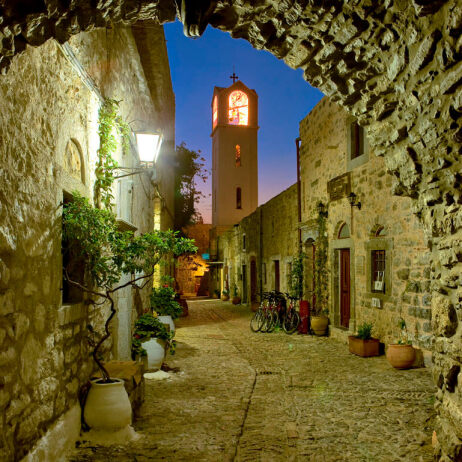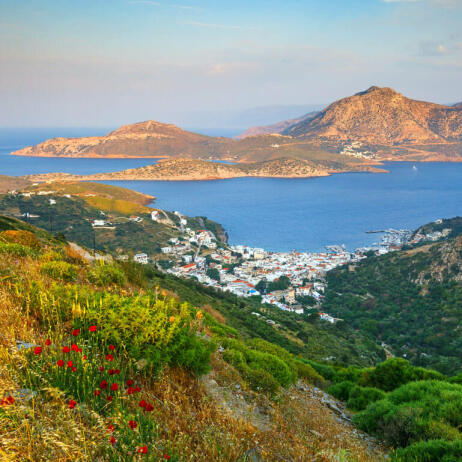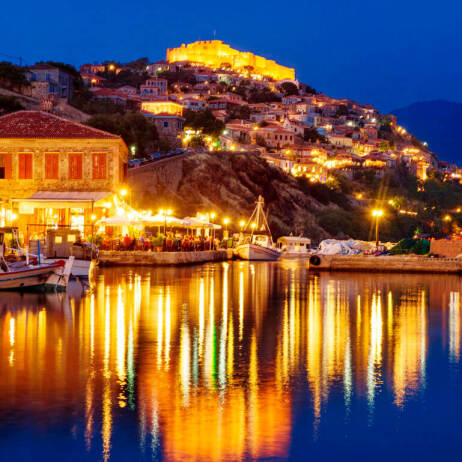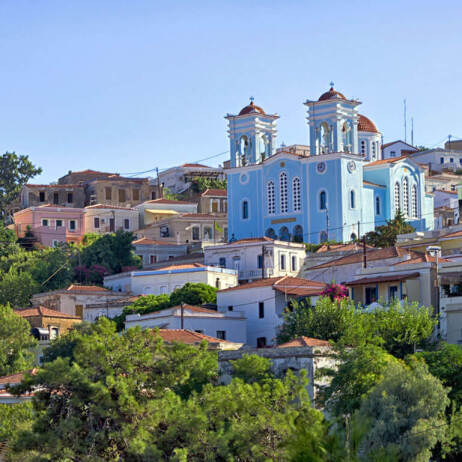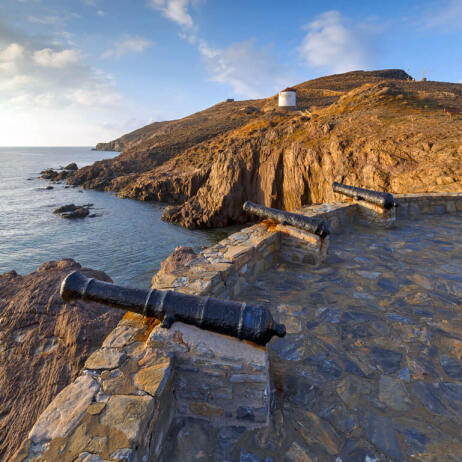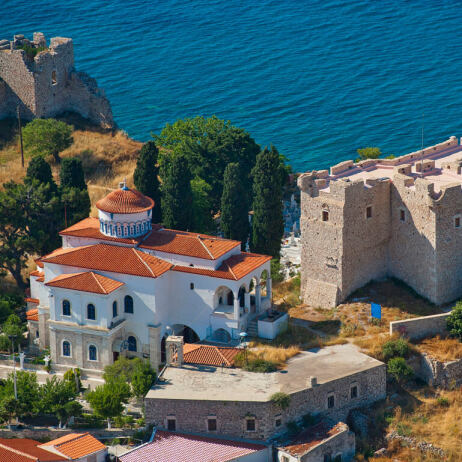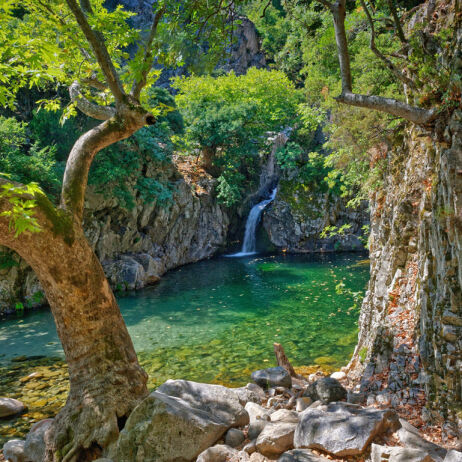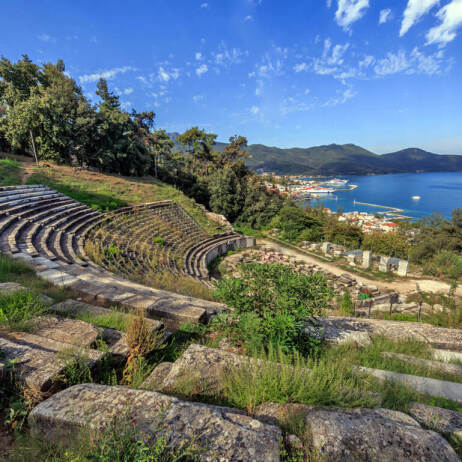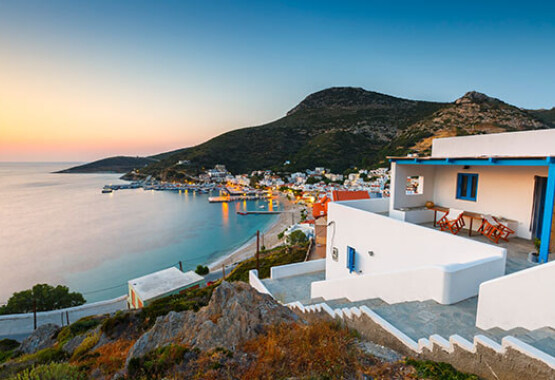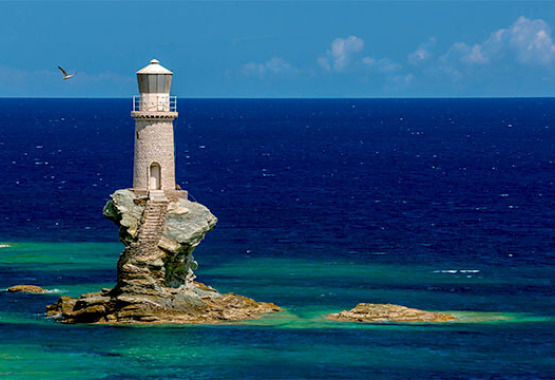
Geoparks in Greece
Greece is a land shaped by dramatic geological forces. Over millions of years, continuous mountain formation has sculpted a landscape rich in striking natural monuments and breathtaking formations.

Just a breath away from the Asia Minor coast, in the northeastern part of the Aegean Sea, explore islands with fascinating green landscapes, crystal clear waters, beautiful sandy and pebbly beaches, traditional villages and rich history on each island.
Choose among big islands (Ikaria, Samos, Limnos, Lesvos, Chios, Thasos, Samothrace) and some smaller ones (Agios Efstratios, Agios Minas, Antipsara, Thymaina, Oinousses, Samiopoula, Fournoi and Psara) offer you exciting holiday options.
Despite the fact that some of these islands are far from mainland Greece, they have grown into popular destinations thanks to frequent ferry and flight connection.
A small island on the edge of the Aegean, marked by Greece's modern political history, as it was a place of exile, Agios Efstratios – Ai Stratis to the locals – is blessed with the beauty of its landscape and, mainly, the fortitude of its people.
The only hamlet on the island lies in the valley formed by two dried river beds. Until the devastating earthquake of 1968 this is where the locals’ vegetable and fruit gardens used to be. The old hamlet was perched at the top of the hill, above the harbour, with stone built, two- or three-storey traditional houses, but after '68 the few residents were forced by the military government to move to uniform homes, abandoning their old “Chora”. Thankfully, some of the stone homes were saved from complete destruction; these were restored with reverence by the locals of Agios Efstratios. Οne of them, the Marasleios School of 1909, presently houses the Museum of Democracy.
Much as Chios is famous for its mastic, it is not the only “magic” one can find on this island. Alongside its rich history starting from the Neolithic Age and including adventures with Saracene pirates and the Turks during the Greek Revolution, Chios also claims to be the birthplace of Homer. It was certainly the birthplace of eminent Greek politicians and writers such as Adamantios Korais, Emmanouil Roidis and Alexandre Mavrokordatos.
There is only one way to travel back in time and experience old Greece up close: take a ship and get off at Fournoi!
The place is pregnant with history: there are ancient finds scattered throughout the island dating back to the Ionians, Classical and Hellenistic times. The Cyclopean wall with traces of an Acropolis on the Hill of Ai Giorgis, the ruins of the ancient temple at Kamari and the remains of homes on the sea bed, the shrine to Poseidon at Agia Triada in Chrysomilia, the ancient quarry at Petrokopio.
As a matter of fact, Fournoi is not just one island, but a formation of small ones, of which only two are inhabited: Fournoi and Thymaina. Islands of fishermen and beekeepers, they provide visitors with all basic comforts. Campos, the island's main village, offers tavernas, patisseries, shops selling traditional products, a soft drink bottling workshop (the local orange soda is everyone's favourite refreshment here) and, of course, bakeries (fournoi in Greek). The main occupation of the locals, however, is not related to the land, but to the sea. The island has a large fishing fleet – disproportionate to its size – and has developed into one of the most important fishing centres in the Aegean. For this reason it is heaven for those who love fish in their diet, with unique opportunities to enjoy top quality fish, such as the Common Dentex, the Pink Dentex, the Common Pandora, the Dogtooth Grouper, as well as sea food and lobsters.
Besides the island’s sandy beaches, running waters, mountains and green hillsides its name, Ikaria, is intertwined with Greek mythology and Ikarus. The thermal springs on the island are renowned for their chemical composition. The unparalleled local lifestyle, along with the one of a kind work-rest schedule, the famous festivals and traditional dances, the local customs, are just some of the reasons why you should explore this impressive destination. Enjoy its beautiful gorges. Swim in the crystal clear waters. Savour fresh fish and sip fragrant wine, while you let yourselves become an Ikarian, as they are connoisseurs of the secrets for longevity!
The magnificent island of Lesvos is the third largest of the country. Enjoy the mild mediterranean climate, the rich flora and fauna, the springs, the olive groves, the petrified forest, the picturesque traditional villages, the delicious local products (such as ouzo and olive oil) and the island’s subsequent architecture to the 19th century industrial development.
Throughout the ages, Lesvos contribution to the arts is priceless. During antiquity and contemporary times, prominent members of the arts and politics, were born on this particular island. You might have heard of some of them: Sappho (poet), Alcaeus (poet), Arion (poet and musician), Terpander (poet), Theophrastos (philosopher), Pittacus of Mytilene (statesman and sage), Theophilos (painter), Elias Venezis (novelist), Stratis Myrivilis (writer), Argyris Eftaliotis aka Kleanthis Michaïlidis (scholar), Georgios Jakobides (painter), Efstratios Eleftheriades aka Tériade (art critic, publisher) and the nobelist Odysseas Elytis (poet, essayist).
Limnos is a beautiful North Aegean Sea island, which was shaped by volcanic eruptions in the distant past. It is a place with a centuries-old history, and a popular holiday destination that will capture your heart - the perfect place to chill out. You will see imposing rock formations, peculiar volcanic landscapes, rolling green hills, extensive plots of fertile land, huge sand dunes, and wetlands brimming with life. The winding shoreline stretches and curves for 259km, shaping the island’s sheltered coves, picturesque little harbours, and golden sandy beaches washed by crystal-clear waters. The beauty of this diverse uneven landscape is quite impressive.
The island is home to archaeological sites, fortresses, traditional villages, hospitable locals, and a particular & delicious cuisine among the best in the Aegean Sea, with products which have been famous ever since antiquity, such as wine, honey, cheese, fresh fish & seafood dishes: for all the above reasons Limnos Island will surely rank high on your list of favourite holiday destinations.
Oinousses is a cluster of nine small islands and islets, namely Oinoussa, Panagia, Vatos, Gaidouronissi, Pontikonisso, Archontonisso, Pontikoudiko, Laimoudiko and Prassonisia. The Oinousses is a quiet retreat for summer vacationers. A protected area, included in the Natura 2000 Network, the Oinousses are full of beautiful small coves for swimming and beaches for those who better commune with nature when they are in its embrace alone. There is an asphalt road along the perimeter of the island, providing easy access to most beaches. One can even walk along the road on foot, as its total length is a mere 18km.
However, the true secret of the Oinousses is their desert islands. Whether you decide to sail around them on one of the islands’ caiques or paddle to each one in a canoe and spend a night on one of their beaches – as an increasing number of tourists do during summer – you will discover an idyllic natural wealth, virgin fishing grounds and enchanting depths that make up the panorama of the unexplored Aegean Sea.
In fact, it is believed that the name of the island is derived from the root of oenos, the Ancient Greek word for wine. According to another version, the name ‘Egnoussa’ by which the locals are used to refer to their island to this day comes from the ancient word for the willow trees that grow everywhere on the islands.
Travel guides describe the island as “a dot in the sea, far away from established tourism destinations” – but that is only half true, because on this dot shrewd travellers from around the world discover – or, better yet, create – their own personal paradise, with the materials offered by the untamed nature of the Aegean Sea.
The people of Psara are, first and foremost, proud of their glorious past. The revolutionary flag of 1821 – white and red, with a cross and an anchor wrapped by a serpent – welcomes visitors at the harbour, reminding them that the history of this island is interwoven with the history of its untamed soul.
Samos has an outstanding natural landscape, beautiful beaches, fine wine and monuments of sizable cultural significance. Kings, Priests and men of letters had the utmost respect for this island as the sanctuaries and the philosophical societies were considered the spiritual centre in the Mediterranean world. Natives to Samos’ are the Mythical Goddess Hera, the philosopher Epicurus, the astronomer Aristarchus and the great mathematician Pythagoras.
You have two UNESCO monuments to visit: the fortified ancient city of Pythagoreion and the ancient Temple of Hera, Heraion of Samos. Don’t miss the pleasant cultural events and music festivals during the summer months and get acquainted with the island’s history by wandering around the historic village of Vathy.
Referred by mythology as island of Aeolus, Samothrace (you’ll see it spelt “Samothraki” too) is adorned with Mount Saos, the highest mountain in the Aegean; legend has it that Poseidon sat on its top to watch the Troy war. The island with its steep peaks (the highest peak – 1.611 metres- is called “Fengari” = “moon”), the ancient legends, the pebbly beaches, the streams and rivers, the pristine nature, the famous springs and the archaeological finds are just some stuff you'll come across and in love with.
With its rich history and archaeological remains, wonderful beaches, variety of activities to do and friendly people, Thassos has become one of those islands holidaymakers return to year after year. It is also very popular with the Greeks because of the good food, the high-standarded services provided and the very intriguing mixture of the modern and the traditional.
Greece is a land shaped by dramatic geological forces. Over millions of years, continuous mountain formation has sculpted a landscape rich in striking natural monuments and breathtaking formations.
In the island complex of the NE Aegean Sea there are four tiny and precious gems that are worth discovering for their natural beauty, their strong tastes and aromas and, most of all, their unspoiled character conjuring up the old times.
Each Greek Island has a special atmosphere. Depending on your heart’s desire you can find cosmopolitan or low-key islands; islands known as water & extreme sports destinations; islands preferred by art lovers...




